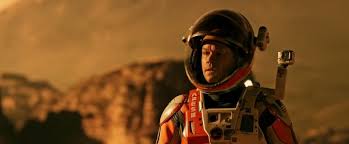
Andy Weir, author of the novel turned box-office smash entitled "The Martian," must be on cloud nine if only for two reasons: First off, it was highly unlikely that this narrative, which was originally published as a mere blog post, would ever be recognized in the national book publishing market--yet it was--and its development into a major motion picture would have any aspiring author residing in a state of complete enjoyment. (This is even if several plot changes have occurred as well as the inevitable time and event compression that takes place when novels are translated to pictures.) Additionally, to have a renown auteur at the helm of the project would surely be a dream come true for any novelist. Although "The Martian" has its shortcomings, it is brilliantly shot (or "built" if you believe in Russian filmmaker V.I. Pudovkin's philosophy of filmmaking), and it brims with a strong sense of professionalism that only a director such as
Ridley Scott can produce.
Now, the story is easy enough to grasp, and it simply involves a sole astronaut/botanist, Mark Watney
(Matt Damon), and his journey to safety after being left for dead on a manned mission to Mars. Well, at least, that it is the case until the political and public relations dealings of NASA come to the forefront, which, interestingly enough, leads to the use of several unflattering techniques such as time stamps and on-screen character introductions to spur the plot further; if there is any prominent flaw here it must be the fact that Damon is reduced in screen time in order to flesh out the workings of these other, rather tiresome aspects. (I must admit that I have much experience in the field of public relations, and to characterize the profession as insipid would undoubtedly be a utilization of the euphemism on my part.) Watney ultimately has to deal with complications stemming from Mars' habitat and equipment malfunctions, as well as what seems to be a conflict created entirely by circumstance, in what eventually becomes a showcase for the complexity that surrounds human relationships and a man's struggle for survival. Of course, these are only two of what seems to be a number of themes that make their way into the margins of the material.
Matt Damon stars as the title character (remember our aforementioned astronaut and botany expert), and he carries the film in the same manner that has defined his celebrated career: with charisma and a force of personality. What makes Damon so unforgettable in this role is his lovableness, for lack of a better term; his ability to grasp a darkened room filled with complete strangers and have them all collectively rooting for his success. Does Damon have the most prestigious résumé in Hollywood? Does he come to resemble great names such as Nicholson, Newman, or Hoffman? Arguably not, but his commitment to certain moments here, which are undeniably infused with human emotion, epitomizes his ability to become that actor of impersonation. To accomplish something that few actors and actresses have touched in a lifetime: that being, essentially, the re-creation of humanity; the construction of a fictional human being in the body of a living individual.

I am quite aware of the fact that Damon has mostly been known as an actor of interpretation, as he rarely changes his physical appearance, and as the depth of some of his previous roles has lacked; however, he comes extremely close in "The Martian" to obtaining this rare and dignified feat. (Fortunately, Scott had the actor film for five weeks solitarily, which assuredly helped the act of getting into character, yet when it came to making that outer transformation--for scenes where Watney suffers from malnourishment--Damon was denied the opportunity. In regard to the actor's health, maybe it was for the best.) Although it is true that Damon could accomplish this without the aid of physical alteration, much like the previously named silver screen legends who never indulged in such techniques, because of the structure of the film, he was never really given the chance. (This harkens back to the running minutes where NASA's daily affairs supersede our involvement with the most integral component to the piece.)
With all of that being said, however, my biggest concern with this film is its inability to make coherent casting decisions. For example, both Damon and
Jessica Chastain were memorable in their roles from last year's space epic entitled
"Interstellar" (a picture that I find to be more profound and clearly more poignant in form) and, although Damon is charming enough to help us buy into that suspension of disbelief, Chastain cannot escape her previous performance. Scene after scene featuring Chastain plods along with little to no viability, as her face and temperament only remind us of Interstellar's more heartwarming moments. (I understand that
Cate Blanchett may have been given the role if not for other engagements, yet it couldn't have been that hard to find another supporting actress without the burden of memorability. Or, maybe it just alludes to the ever diminishing pool of professional actresses worthy of employment.) Nevertheless, the rest of the ensemble cast (outside of
Chiwetel Ejiofor) give uninspiring performances, and this includes
Jeff Daniels, who sticks out as a sore thumb in his portrayal of NASA's director of operations, and
Kate Mara, who I'm sure was just pulled from a nearby 20th Century Fox Studio (considering they were also in charge of this year's unimaginative production entitled
"Fantastic Four," which may have been filming at the same time) in an effort to save time and general exertion.
Moreover, it is ultimately the predictable nature and dramatic structure of the film that prohibits it from reaching elite status. As far as predictability is concerned, let us be frank: Although there is some doubt as to the outcome of Watney's journey while "in the moment," it is evident that heartbreak is the least of the picture's intentions. What's more is the fact that "The Martian" plainly warrants comparison to films such as "Cast Away" and "I Am Legend," where confinement shapes character, yet Watney is never really alone (he has the ability to communicate with others back at NASA), and his survival doesn't wholly depend on his actions. Other, less interesting characters, are responsible for such happenings, and this, unfortunately, throws off the dynamic of the drama and curtails a theme involving man's psyche in survival situations.
This is certainly a different type of film for Ridley Scott, a director who is no stranger to the genre of science fiction. Of course, it does take place on the surface of a foreign planet, which lingers in the stillness of space, and it definitely consists of an innumerable amount of dialogue featuring technical jargon (most of which would confuse even the acutest of scientific minds), yet, unlike his previous science fiction indulgences ("Blade Runner," "Alien," Prometheus"), it doesn't rely on mood and atmosphere to intrigue. Sure, there is a gut-wrenching and rather excruciating scene where Watney must pull out a piece of debris from his midsection--a staple of Scott's films--and sure there is a handful of moments where Scott executes directorial technique with supreme professionalism, but it doesn't have the same effect. (With regard to the latter, Scott utilizes the indirect/subjective viewpoint early on in a brilliant fashion to increase involvement and to set the tone; high camera angles are used in an effort to convey Watney's insignificance on Mars' surface; gyroscopic, mobile shots and fixed frame pan and scans efficiently exhibit the terrain of our setting; he even integrates the GoPro Hero 4 adequately, as it is used for the "suit cam" and to record Watney's journal entries.)

There is even a moment where Kate Mara's character begins to utter the famous tagline for "Alien," (you know, "In space no one can hear you scream") which only adds to the yearning for that spine-chilling ambiance. Yet, I assume Scott's motivation to make this picture hinged on his desire to provide audiences with a human interest tale, which highlights man's innate capacity and pining to help others, which is admirable as it is bold when considering an audience's incapacity to sit through a film void of over-the-top special effects and vacuous action.
If anything, "The Martian" can be seen as certain proof of the digital camera's ability to shoot a beautiful film. (In fact, it not only captures the picturesque landscape of the Jordan red desert where it was filmed in a remarkable fashion, but it bestows the exterior scenes with a sort of warm look and feel, and it gives the interior shots a cool visual attractiveness to counter the former.) Now, these attributes may have more to do with color palettes and camera filters than the actual effectiveness of the camera, yet one cannot deny its capabilities when it comes to producing a sublime work of art. Naturally, this is not to say that I am an advocate for digital filmmaking, as the raw material of celluloid film will always be my preferred choice of medium; however, I do believe that digital cameras are now efficient enough to warrant a pre-production discussion from the picture's design team. One must remember that when color was first introduced to the art of film, not every picture indulged in such luxuries. In general, each project dictated what form to use. It would seem as if "The Martian" required the use of this promising, yet fickle technology.
*On a side note, it has come to my attention that "The Martian" has picked up a nomination from the Golden Globes for Best Picture in the category of Comedy or Musical. Have they lost the faculty of mind to distinguish between genres? Sure, there are a plethora of scenes where humor fuels the moment (most notably where Watney spouts lines such as, "In your face Neil Armstrong," and other lines of dialogue infused with profanity that I dare not produce here), yet this is obviously a film of drama with comedic elements; it is a picture built on its climax and the instances that lead up to such events. I mean, even "Schindler's List" has some humorous situations. I predict this to be a ploy of the Golden Globes in an effort to give two dramatic films nods for Best Picture, as the field for comedy this year has been somewhat forgettable. If this is true, then it is quite improbable that such methods will continue to mask the hole created by the comedy genre's helplessness when it comes to producing an exemplary product. I guess only time will tell whether or not my assertion is correct.

